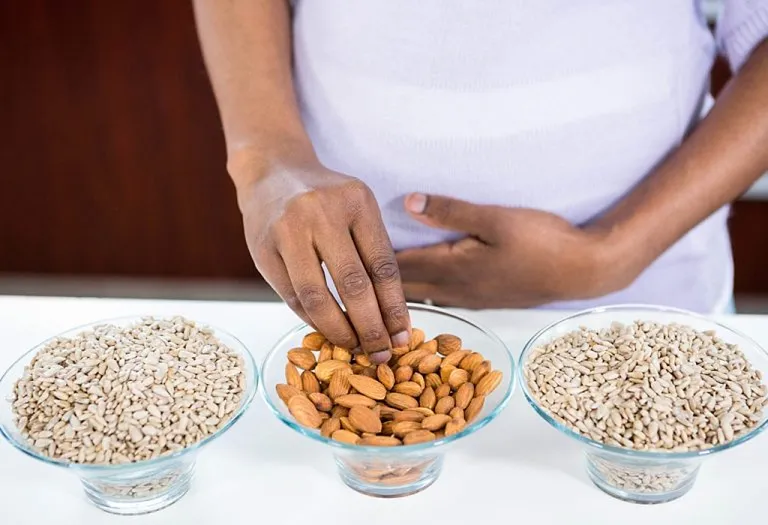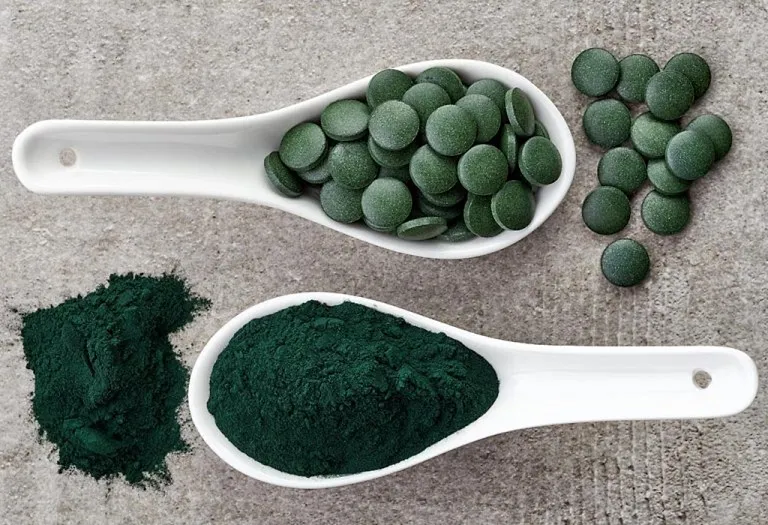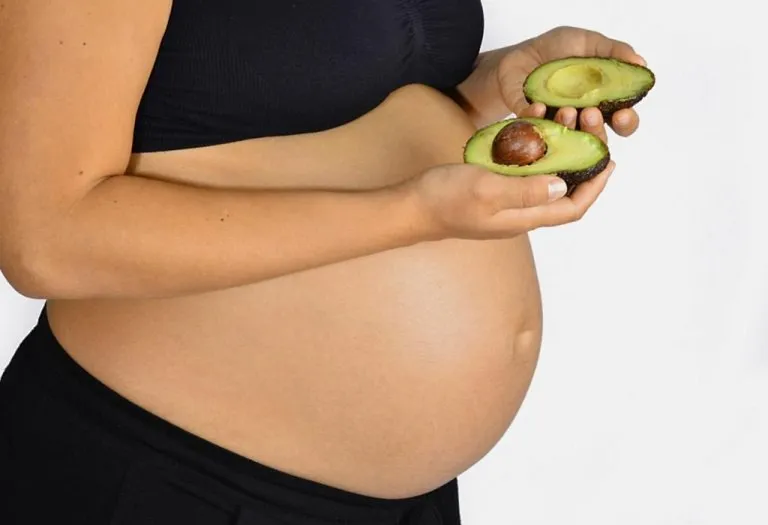Almonds in Pregnancy – Benefits, Side-effects, & How to Eat
From nutrition to daily energy, discover how almonds can support a healthy pregnancy when eaten the right way.

- Nutritional Value of Almond (Badam)
- Can You Eat Almonds While Pregnant?
- Benefits of Almonds During Pregnancy
- Side Effects of Consuming Almond During Pregnancy
- Precautions to Be Taken While Consuming Almonds During Pregnancy
- Ways to Consume Almonds in Pregnancy
- How Many Almonds Should a Pregnant Woman Eat in a Day?
- FAQs
Women need to be careful of what they eat during pregnancy, as their bodies are vulnerable at this time, and certain foods can cause an adverse reaction. Among the many foods that spark curiosity, almonds in pregnancy often top the list. Almonds, or badam, comprise essential fats, proteins, and important vitamins that are required for the healthy growth of the baby in each trimester. If the right amount is added to everyday meals, a healthy pregnancy is sure to follow. Let’s read and learn more about badam in pregnancy, it’s nutritional value, and some of the best ways to consume almonds while pregnant.
Nutritional Value of Almond (Badam)
Raw almonds can be consumed as a snack or with meals, provided they are taken in moderation (1).
| Nutrients | Value |
| Energy | 576 Kcal |
| Carbohydrates | 21.69 g |
| Fat | 49.42 g |
| Protein | 21.22 g |
| Fibre | 12.5 g |
| Sugars | 4.35 g |
| Calcium | 269 mg |
| Iron | 3.7 mg |
| Magnesium | 270 mg |
| Phosphorus | 481 mg |
| Sodium | 1 mg |
| Zinc | 3.12 mg |
| Thiamin | 0.205 mg |
| Niacin | 3.7 mg |
| Riboflavin | 3.7 mg |
| Vitamin B6 | 0.137 mg |
| Vitamin E | 25.63 mg |
From the above chart, we can see that there are a variety of nutrients packed in the small-sized almond! Therefore, you must consume almond nuts during pregnancy.
Can You Eat Almonds While Pregnant?
Generally, women tend to abstain from consuming nuts and dry fruits during pregnancy due to their high heat and fat content. But are almonds good for pregnancy? The truth is, almonds are completely safe to consume during pregnancy (2). Rumours and myths that eating nuts during pregnancy can cause nut allergies in babies lack a scientific basis. The only reason to avoid them is when you are allergic to them.
However, please note that excessive intake of raw almonds has been linked in some reports to premature delivery. Thus, consuming in moderation is paramount.
Benefits of Almonds During Pregnancy
Science has backed the consumption of badam during pregnancy as safe. Here are some of the main benefits of almond nuts in pregnancy:
- Almonds provide folic acid, an integral requirement for the brain and for the neurological development of the foetus.
- Almonds are a good source of dietary fat and carbs. They also help in reducing oxidative stress, inflammation, and blood sugar. This prevents babies from metabolic disorders later in life, usually in the case of high-risk pregnancies such as obesity and diabetes in the mother-to-be (3).
- Almonds help decrease the hunger hormone, ghrelin, and help increase the appetite-reducing hormone, leptin (4) (5). This helps you maintain a healthy weight. It will also help you with reducing weight post-pregnancy.
- It is rich in iron, which helps develop the baby’s heart and boosts immunity (6) (7).
- Eating 4-6 almonds every morning can improve your memory.
- Soak almonds throughout the night and boil them next morning and make a paste. This paste, when used as a face scrub, exfoliates the dead skin cells and gives you radiant skin (8).
- Soaking almonds initiates the release of lipase, which assists in the breaking down of fat. This improves the digestion and absorption of nutrients (8).
- Studies show that almond consumption helps in increasing the amount of alpha-tocopherol, a compound present in blood that regulates the blood pressure.
- Fibre, which is essential for proper digestion while vitamin E keeps skin and hair healthy.
- Magnesium, riboflavin, and folate (Vitamin B9) are required for proper brain functioning as well as maintaining the nervous system (8).
- Manganese regulates body weight in both mother and child.
Side Effects of Consuming Almond During Pregnancy
During pregnancy, maintaining a balanced diet is crucial for both the mother’s and baby’s well-being. While almond for pregnant woman is a nutritious snack packed with essential nutrients, there are certain considerations expectant mothers should be aware of. Here are some potential side effects when is comes to almonds and pregnancy:
1. Risk of Allergies
Almonds are among the common allergenic nuts. If you have a history of nut allergies, it’s wise to exercise caution or consult your healthcare provider before including almonds in your diet (9).
2. Digestive Discomfort
In some cases, the high fibre content of almonds can lead to digestive issues like bloating or gas. It’s advisable to consume them in moderation and ensure they’re well-chewed (10).
3. Potential for Weight Gain
While almonds are a healthy source of fats, they are calorie-dense. Overconsumption can lead to excessive calorie intake, potentially contributing to unwanted weight gain.
4. Oxalate Content
Almonds contain oxalates, naturally occurring compounds that can crystallise in body fluids. In individuals prone to kidney issues, high oxalate levels may lead to kidney stone formation.
5. Interaction With Medications
In rare cases, almonds can interfere with certain medications or supplements by affecting mineral absorption, especially if consumed in large quantities (11).
Precautions to Be Taken While Consuming Almonds During Pregnancy
While almonds are packed with nutrients that benefit both mother and baby, eating them the right way and in the right amount is crucial to avoid unwanted side effects. To make the most of their goodness without any risk, here are a few precautions to keep in mind.
- Vitamin E Overdose: Almonds are one of the best sources of vitamin E, providing 48% of the recommended intake in just 1 ounce. Other food consumed during pregnancy like green leafy vegetables and fruits also contains substantial amounts of vitamin E. Too much vitamin E consumption can lead to blurred vision, headaches, and diarrhoea.
- Bloating and Constipation: Consuming more almonds than the recommended intake may cause bloating and constipation. This is because almonds are fibre-rich and your body is not used to consuming so much of fibre on a daily basis (10).
Ways to Consume Almonds in Pregnancy
Almonds can be enjoyed in several delicious and healthy ways during pregnancy, making it easy to add their goodness to your daily routine. To help you get started, here are some of the best ways to consume almonds in pregnancy.

- Soaked Almonds: Soak a handful of almonds overnight and peel them in the morning before eating. This helps in easier digestion and better nutrient absorption.
- Almond Milk: Blend almonds with water to make fresh almond milk. It’s a nutritious and dairy-free alternative rich in calcium and healthy fats.
- Almond Smoothies: Add a few soaked almonds to your fruit smoothie for a creamy texture and an extra protein boost.
- Roasted Almonds: Lightly roast almonds for a crunchy and satisfying snack that curbs hunger between meals.
- Almond Butter: Spread natural almond butter on whole-grain toast or fruits for a tasty and energy-rich snack.
How Many Almonds Should a Pregnant Woman Eat in a Day?
A single ounce (28 gram) comprises 23 almonds on an average. Eating one ounce per day has been judged to provide the best benefit without any drawbacks. If you want a schedule on when and how many almonds to consume, 10 in the morning and 10 in the evening can be a good plan. Every individual is different, so build a plan that suits your body in consultation with the doctor.
FAQs
1. Can I eat almond flour while pregnant?
Yes, almond flour is safe during pregnancy. It’s a nutritious gluten-free option, high in protein and healthy fats. Use it in moderation for baking or as a coating.
2. Can I have almond extract during pregnancy?
Yes, almond extract is generally safe when used in small amounts for flavouring. However, ensure it’s pure and doesn’t contain any harmful additives. Always consult your healthcare provider for specific dietary concerns.
3. Are almonds good in the third trimester of pregnancy?
Yes, almonds in pregnancy’s third trimester can be highly beneficial when eaten in moderation. They provide essential nutrients like calcium, magnesium, protein, and healthy fats that support the baby’s brain and bone development in the final stages of growth. Almonds also help boost the mother’s energy levels and reduce fatigue, which is common in the last trimester.
Considering the numerous advantages that this nut offers, pregnant women who are not allergic should definitely incorporate badam into their diets. Make sure to always eat them in moderation, as consuming too much can have bad repercussions. Try leaving the almonds soaked in water through the night. The benefits are much more compared to when they are dry. Space the consumption evenly and enjoy good health and a happy pregnancy.
Also Read:
Pista (Pistachios) when Pregnant
Consuming Peanuts while Pregnant
Eating Cashew Nuts during Pregnancy
Health Benefits of Eating Makhana in Pregnancy
Was This Article Helpful?
Parenting is a huge responsibility, for you as a caregiver, but also for us as a parenting content platform. We understand that and take our responsibility of creating credible content seriously. FirstCry Parenting articles are written and published only after extensive research using factually sound references to deliver quality content that is accurate, validated by experts, and completely reliable. To understand how we go about creating content that is credible, read our editorial policy here.
2. Johns Hopkins Medicine – 5 Snack Foods to Eat While Pregnant
6. Almond Board of California – HEAD-TO-TOE NUTRITIONAL BENEFITS
7. PubMed – Health benefits of almonds beyond cholesterol reduction
8. Medanta – 10 Incredible Health Benefits of Soaked Almonds – Why You Should Eat Them Daily!
9. Cleveland Clinic – Tree Nut Allergy




































